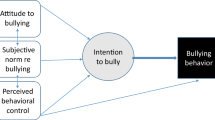Abstract
The purpose of this study is to investigate teacher perspectives on peer relation problems of young children. Examined are teacher definition of and assessment criteria for peer relation problems, and the most poignant peer relation problem perceived by teachers. Three experienced American preschool teachers are interviewed and observed for one year. It is found that the teachers define children’s peer relation problems as part of developmental processes and individual differences. The teachers judge peer relation problems in terms of children’s emotional well-being, intentions, and social skills, and perceive children’s control of others as the most serious peer relation problem in the classroom. It is posited that the teachers’ perspectives rely on the emotional and motivational bases of children’s relationships with peers. The related issues are discussed and implications for teaching practices are provided.
Similar content being viewed by others
References
Anderson, S. & Messik, S (1974). Social competency in young children.Developmental Psychology, 10, 282–293.
Asher, S. & Coie, J. (1990).Peer rejection in childhood. Cambridge University Press.
Cassidy, J., & Asher, S. (1992). Loneliness and peer relations in young children.Child Development, 63, 350–365.
Chafel, J. (1987). Social comparisons by young children in preschool: Naturalistic illustrations and teaching implications.Journal of Research in Childhood Education, 2(2), 97–107.
Cosaro, W. (1985).Friendship and peer culture in the early years. Norwood, NJ: Ablex.
Cosaro, W., & Schwarz, K. (1991). Peer play and socialization in two cultures: Implications for research and practice. In B. Scales, M. Almy, A. Nicolopoulou, & S. Ervin-Tripp (Eds.),Play and the social context of development in early care and development (pp. 234–254). NY: Teachers College Press.
Denzin, N. (1982). Contributions of anthropology and sociology to qualitative research methods. In E. Kuhns & S. Martona (Eds.),New directions for institutional research: Qualitative methods for institutional research (pp. 17–26). San Francisco: Jossey-Bass.
Greenspan, S. (1981). Defining childhood social competence: A proposed working model.Advances in Special Education, 3, 1–40.
Hay, D. (1984). Social conflict in early childhood. In G. Whitehurst (Ed.),Annals of child development (Vol. 1, pp. 1–44). Greenwich, CT: JAI.
Howes, C. & Hamilton, C. (1992). Children’s relationships with child care teachers.Child Development, 63, 867–878.
Hymel, S., & Rubin, K. (1985). Children with peer relationships and social skills problems: Conceptual, methodological, and developmental issues.Annals of Child Development, (Vol. 2, pp. 251–297). Greenwich, CT: JAI.
Jordan, D., Cowan, A., & Roberts, J. (1995). Knowing the rules: Discursive strategies in young children’s power struggles.Early Childhood Research Quarterly, 10, 339–358.
Ladd, G. (1985). Documenting the effect of social skill training with children: Process and outcome assessment. In B. Schneider, K. Rubin, & J. Ledingham (Eds.),Children’s peer relations: Issues in assessment and intervention (pp. 243–219). New York: Springer-Verlag.
Ladd, G. (1990). Having friends, keeping friends, making friends, and being liked by peers in the classroom: Predictors of children’s early school adjustment?Child Development, 61, 1081–1100.
Ladd, G., & Coleman, C. (1993). Young children’s peer relationships: Forms, features, and functions. In B. Spodek (Ed.),Handbook of research on the education of young children (pp. 57–76). New York: Macmillan.
Marantz, M. (1988). Fostering prosocial behavior in the early childhood classroom: Review of research.Journal of Moral Education, 17(1), 27–37.
O’Mally, M. (1977). Research perspectives on social competence.Merrill-Palmer Quarterly, 23(1), 29–44.
Paley, V. (1986). On listening to what the children say.Harvard Educational Review, 56, 122–131.
Paley, V. (1992).You can’t say you can’t play. NY: Teachers College Press.
Parker, J. & Asher, S. (1987). Peer relations and later personal adjustment: Are low-accepted children at risk?Psychological Bulletin, 102(3), 357–389.
Putallaz, M. (1983). Predicting children’s sociometric status from their behavior.Child Development, 54, 1417–1426.
Ramsey, P. (1991).Making friends in school: Promoting peer relationships in early childhood. New York: Teachers College Press.
Renshaw, P., & Asher, S. (1983). Children’s goals and strategies for social interaction. Merrill-Palmer Quarterly,29, 353–374.
Shantz, C. (1987). Conflicts between children.Child Development, 58, 283–305.
Strayer, F. (1980). Child ethology and the study of preschool social relations. In H. Foot, A. Chapman, & J. Smith (Eds.),Friendship and social relations in children (pp. 235-265). John Wiley & Sons.
Wheeler, E. (1994). Peer conflicts in the classroom: Drawing implications from research.Childhood Education, 70, 269–299.
Wilson, K. (1988).The development of conflicts and conflict resolution among preschool children. Unpublished master’s thesis. Pacific Oaks College, Pasadena, CA.
Yinger, R. (1986). Examining thought in action: A theoretical and methodological critique of research on interactive teaching.Teaching and Teacher Education, 2(3), 263–283.
Author information
Authors and Affiliations
Corresponding author
Rights and permissions
About this article
Cite this article
Moon, M. Teacher perspectives on peer relation problems of young children. Asia Pacific Educ. Rev. 2, 22–31 (2001). https://doi.org/10.1007/BF03024929
Received:
Revised:
Accepted:
Issue Date:
DOI: https://doi.org/10.1007/BF03024929




